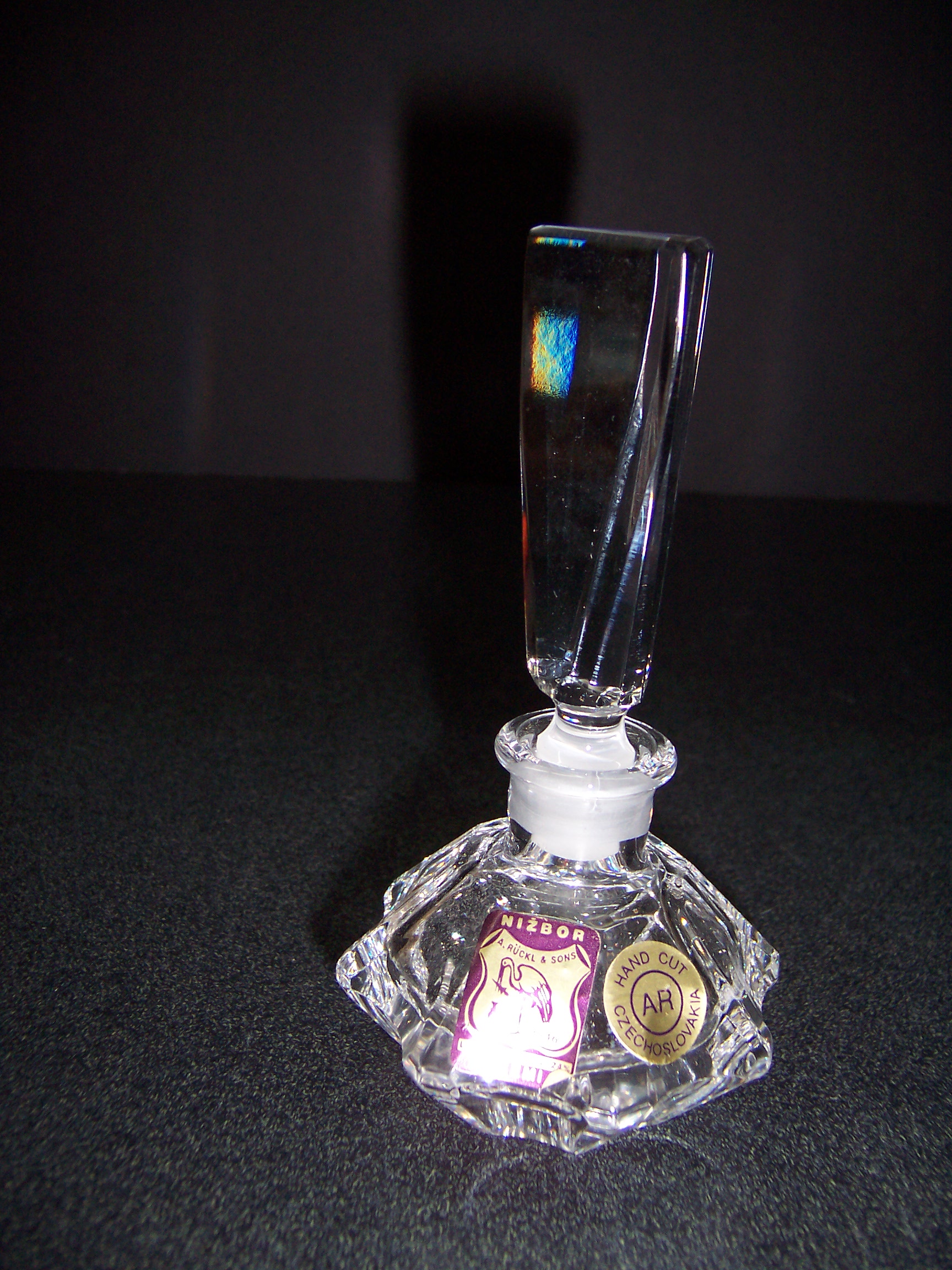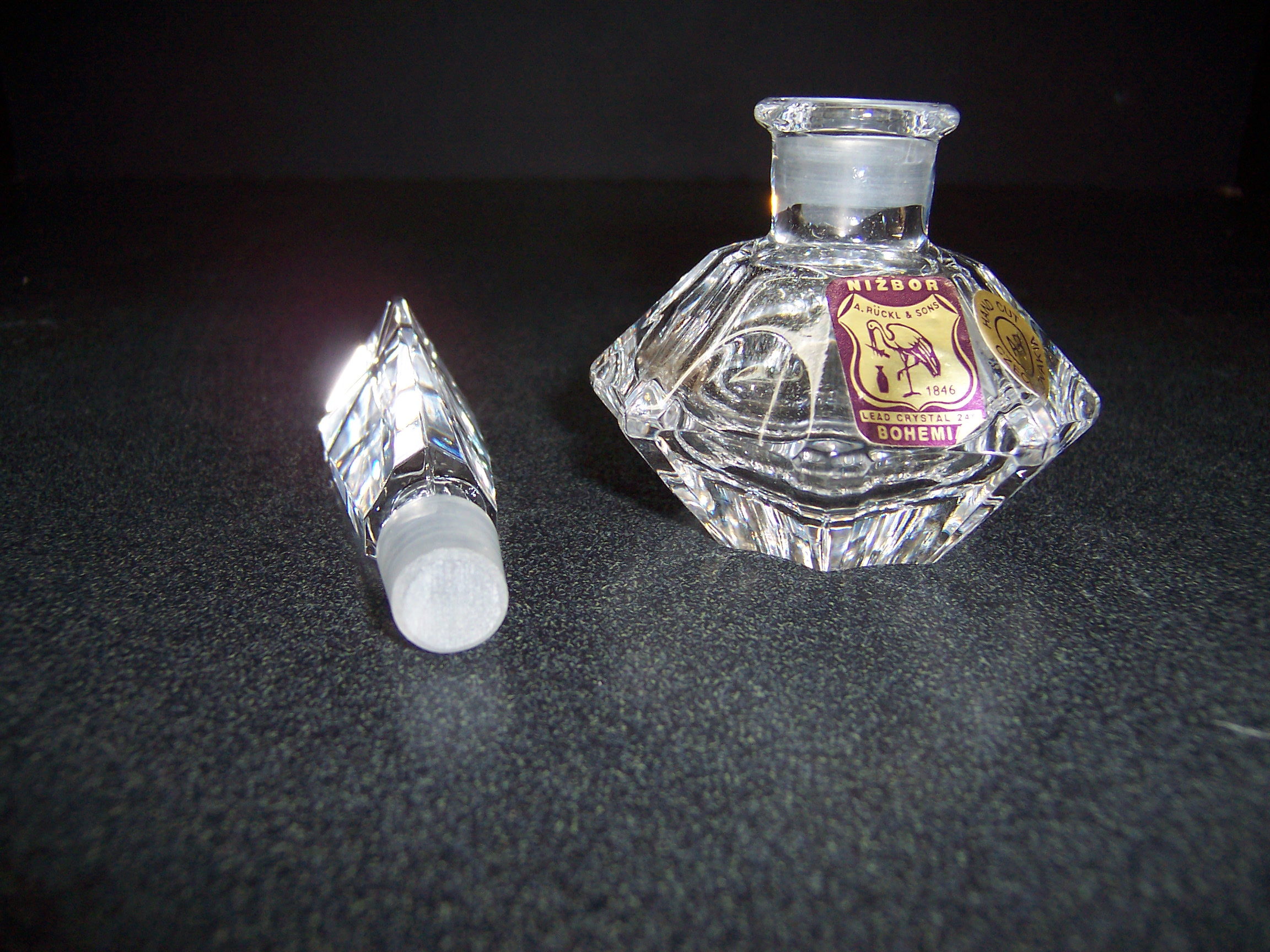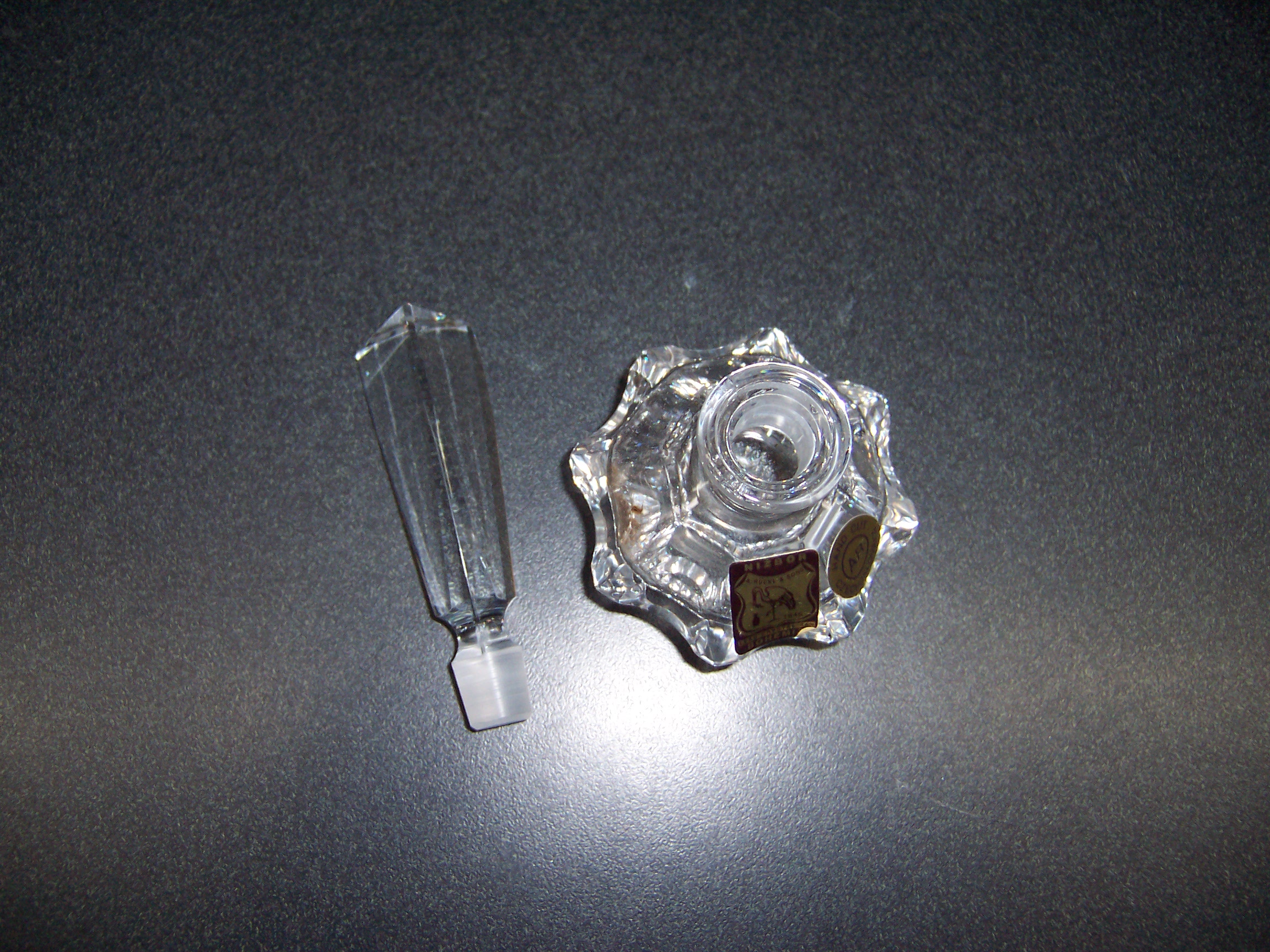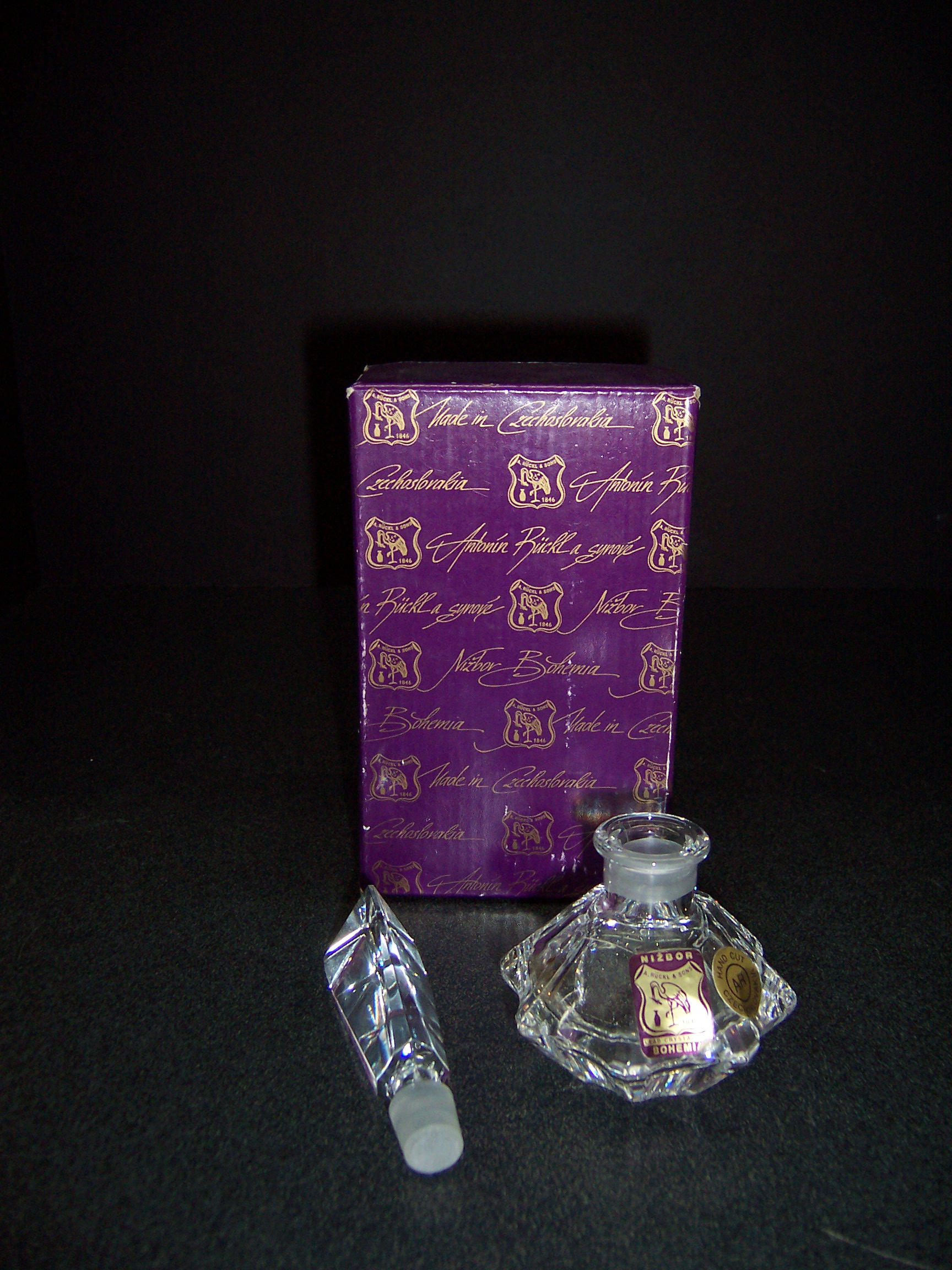Description
Ruckl Crystal Perfume Bottle Bohemia in like new condition with original box. It measures 4.75″ high x 2 5/8″ diameter.
History
RÜCKL CRYSTAL a.s., is connected to a 300 year long tradition in glass making as a family. The glass making family Rückl came to Bohemia at the turn of the 17th and 18th centuries, most probably from what is now Switzerland. Leaving Italy they went through Switzerland and Bavaria into Šumava and then on into eastern and northern Bohemia. Records from 1704 show that Sebastian Rückl, an eminent glassblower, worked as a master glassmaker in Šumava near to Klášterský Mlýn at the “Zlatá studna” (Golden Well) smelter. The direct ancestors of the founder of the Nižbor glassworks settled in the Chrudim region and in 1846 Jan Rückl founded a glass smelter in the then Cyranův Wostrov (the present Ostrava). His son, Antonín, then went on to build a glassworks in Včelnička near Jindřichův Hradec in 1875, in Skalice near Česká Lípa in 1893 and his last and most modern construction was the glassworks built in Nižbor near Beroun in 1903.
In 1923 the business, made up of the glassworks in Včelnička, Skalice and Nižbor with a wholesale warehouse in Prague, was turned into a Family joint stock company, the shareholders of which were solely members of the Rückl family. In the interwar period the plants produced virtually the entire range of home and decorative glassware; that being crystal glass and lead crystal, clear or coloured, cut, polished or painted. The glassworks’ good name, both at home and abroad, was supported by their serious social policy and successful cooperation with artists, prestigious drinks and decorative glass designers, among whom were professor Drahoňovský and Ludvika Smrčková who was just making a name for herself. The glassworks in Nižbor was particularly important. The firm had outlets abroad, most significantly in London and Damascus.
After the end of the Second World War the firm, due to its size, was nationalised. In Czechoslovakia there was an organisational concentration of glass production and the nationalised glassworks were incorporated into the newly established national enterprises. Thus the glassworks in Nižbor became part of the national enterprise Český křišťál (Czech Crystal) with its headquarters in Česke Budějovice and later, in 1965, it was placed in the monopoly grouping for leaded glass “Sklárny Bohemia” (Bohemia Glassworks) with its headquarters in Poděbrady. In this period the glassworks in Nižbor set up another two cutting plants one in Annín and one in Vimperk.
The glassworks in Nižbor was designed so that the capacity of its smelter was able to cover the needs of semi-finished glass products for further treatment in both its own cutting rooms and those in Annín and Vimperk. The quality of the work and the extensive range of goods placed the Nižbor glassworks among the best for cut lead crystal in the then Czechoslovakia.
Jiří RücklOn the 1st of June 1992, on the basis of a winning privatisation project and the consequent purchasing of the plant from the National Property Fund, ing. Jiří Rückl, a direct descendent of the Rückl glassmaking family, became the owner of the Nižbor glassworks. He set up the firm Antonín Rückl a synové s.r.o.,sklárna Nižbor”. On the 1st of September 1993 the glassworks in Annín were bought from Sklárny Bohemia a.s., Poděbrady.
In 1996 the company invested into the construction of a modern smelting unit, two annealing conveyor ovens and a control system for the smelting operation. During this reconstruction the heating media was changed from town gas to natural gas. This investment meant a marked a shift in the quality of production achieved and its yield for the company. A glass sales shop was built in the grounds of the Nižbor glassworks which also offered refreshments for visitors. Cooperation was established with domestic and European travel agencies and the offer for their clients was significantly extended. Guided tours are organised of the production plants at the glassworks.
In 1998, on 30 September precisely, the Nižbor glassworks, originally Antonin Rückl and Sons, s.r.o., was transformed into the joint-stock company RÜCKL CRYSTAL a.s., which became its legal successor.
In 2005 control of the family joint-stock company was given over to the full competence of the daughters of Ing. Jiří Rückl, those being Ing. Simona Prokopová – Rücklová, inMarkéta a Simona the role of Managing Director and President of the Board of Directors, and Markéta Rücklová in the role of Director for PR and Tourism and member of the company’s Supervisory Board. The continuity of ownership at the Nižbor glassworks as a family company was thus maintained.
In 2007 the modernisation of the glassworks’ technological operations continued with the construction of a new continual smelting unit with a sophisticated control system for the melting process and with a system to optimise use of waste heat for the glassworks’ operational needs. In this context operation of the solid-fuel boiler room came to a definitive end and an automatic gas boiler for resolving the glassworks’ fluctuating operational energy needs was built. These investments have made an important environmental contribution in meeting the goals the company has adopted in the area of air protection. Subsequently, technological plants were built for painting, sanding and large-scale grinding of the glass products’ surfaces.
In 2012, following the large-scale comprehensive reconstruction of parts of the glassworks’ original buildings, a new semi-automatic chemical polishing shop for the glass products was put into service with high technological, technical and environmental parameters, including modern facilities for storing and decanting the chemicals.




